Nassau County DA Madeline Singas: “It’s Not About Being a Man or a Woman; It’s about the Work that You Do”
Madeline Singas just won reelection to be the Nassau County District Attorney in Long Island, New York based on her record: crime went down 25% during her watch, the notorious MS-13 gang in the county was decimated with arrests, and her two-pronged approach to the opioid crisis, combining law enforcement with prevention and treatment, has brought overdose deaths down another 25%.

“I took money, forfeiture money that we seized from criminals, primarily drug criminals, and put it back into treatment,” says the 53-year-old career prosecutor with a 28-year record. “We opened the first 24-hour, seven-day-a-week treatment center in Nassau County. And that was really significant, because I had been talking to a lot of people whose loved ones were impacted by this crisis. And they had told me, there’s nowhere to go.”
She was first elected in 2015 over an established opponent because of her record as a prosecutor and because she made clear just how important and wide-ranging the job of the DA really was.
“Most people don’t realize the work that the district attorney does,” she says. “I was able to demonstrate for them that from the moment you shut your doors at night is your neighborhood safe? Is your home safe? Are your children safe? Everything that you do throughout the day in some way can be impacted by the work that we do. So when people say that, oh, this election doesn’t really matter in my life, I would say to them it absolutely matters in your life. That’s the work that we do in my office every day.”
Singas grew up in Astoria, Queens, the daughter of Greek immigrants from Epiros, and got her first job with the Queens DA. She is a graduate of Barnard College and Fordham University Law School.
“I wanted to make sure that I was doing something that had value, that I can be proud of, that my kids can be proud of,” she says of her prosecutorial career. “This is fundamentally something that I enjoy doing and that’s why I keep doing it.”
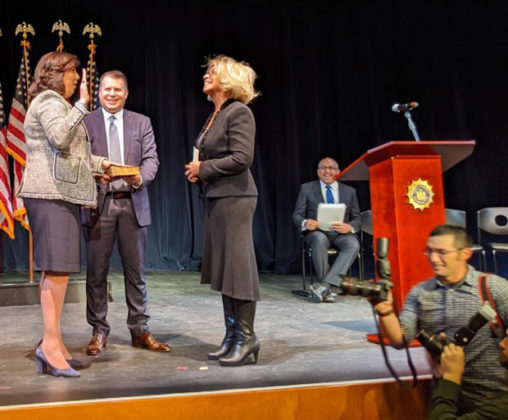
DA being inaugurated by New York State Court of Appeals Chief Judge Janet DiFiore. Bible held by the DA’s husband, Theo Apostolou; PHOTO: ANAMNISEIS.NET
Why did you become a prosecutor?
I knew that I wanted to be in a field that helped people. And I knew I wanted to be in front of juries and doing some litigation in court. And from the minute I went into court and said Madeline Singas for the people, it just sort of clicked for me and I knew that this is what I would want to do for the rest of my career and I never looked back.
You see the dark of society every day: does that get a little overwhelming sometimes?
It is hard, because every day we see a lot of pain. We see the worst that humanity has to offer. And I often say that people come to us really at their darkest times, when they’ve been a victim of a crime: it’s a dark period and that’s when we see them. But, you know, I think our job is also full of hope and making sure that we can restore dignity to the people who have been victimized. Making sure that people get a fair shake in the criminal justice system, that we protect everyone’s rights, including those who have been accused of crimes. Our office is a place full of hope, and there’s a lot of very decent people working very hard to make sure that the chaos stays outside our doors and that we bring justice to people.
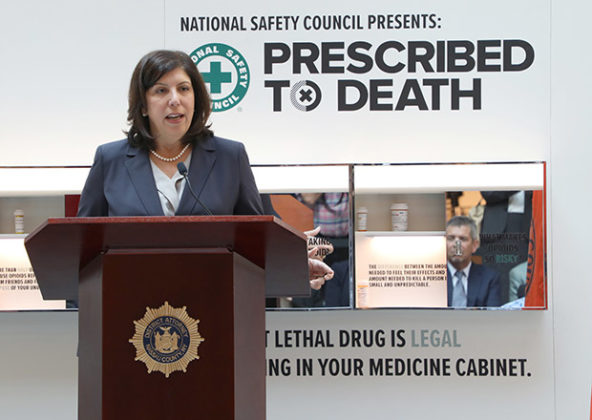
DA speaking at National Safety Council’s traveling Opioid Memorial
What are the particular challenges that you face in Nassau County?
We’re facing a lot of challenges that the rest of the nation is also facing. So heroin and the opioid crisis has hit Nassau County very hard, as it has the whole country. That’s something that we are working to battle every single day. Our OD’s have finally trended downward in the last couple of years. Since 2016 we’ve had a 25% reduction in overdose deaths. And that’s a combination of various things. I think, first, strong enforcement: we’ve had the largest seizures of both heroin and fentanyl in the last few months that we’ve ever had in the county. It’s a lot of work with our law enforcement partners, including, of course, the Nassau County Police Department that we work with every day.
What about treatment?
Without treatment I felt that we couldn’t turn the corner in Nassau County, and treatment wasn’t that readily available. What we did is in 2016 I took money, forfeiture money, so money that we seized from criminals, primarily drug criminals, and put it back into treatment. And we opened the first 24-hour-a day, seven-day-a week treatment center in Nassau County. We worked with a place called Catholic Health Services New Hope, and we were able to finance them so that they could make their operation 24 hours a day, seven days a week. So now people had somewhere to go and we could close that treatment gap.
You said prevention is also a big part of this?
We get into schools and reach kids before they start experimenting with these drugs. My prosecutors are in classrooms and schools several times a month talking to kids about opioids, but also talking to kids about a lot of things, including dating violence and Internet safety and drunk driving. That’s something that I’m passionate about and something we prioritize to make sure we can influence our young people at a time when we can influence them and make sure they don’t go down a path that will lead to criminality.
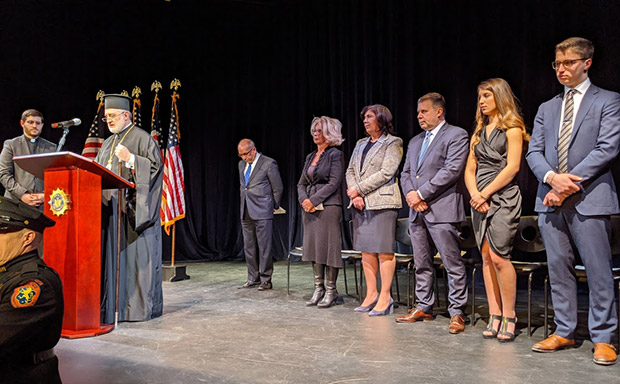
Archbishop Elpidophotos of America is giving the invocation at DA’s inauguration. From left, Oscar Michelen, Esq, the master of ceremonies, Court of Appeals Chief Judge Janet DiFiore, District Attorney Madeline Singas, her husband Theo Apostolou and their children Deme & Billy.; PHOTO: ANAMNISEIS.NET
How big is your department and how many prosecutors do you have?
I have about 222 prosecutors and the office is almost 400 people. It’s one of the largest prosecutor’s offices in the state, as it should be. Cause we represent 1.3 million people in Nassau County. It’s the largest law firm, if you will, in Nassau County. We employ a lot of people and we attract the best and the brightest from our law schools.
Are there any particular challenges to being a woman DA?
Well, that’s an interesting question. I think at this point in my career, no: I wouldn’t say that anyone looks at me and says she’s a woman DA versus a man DA. They see someone who is an experienced prosecutor. I’ve been doing this now for 28 years. So people judge me on my record and on my experience. In the beginning, it was very difficult to be a woman in this field. I would often walk into meetings and there’d be hundreds of people there and there’d be only 5% or 10% of us would be women.
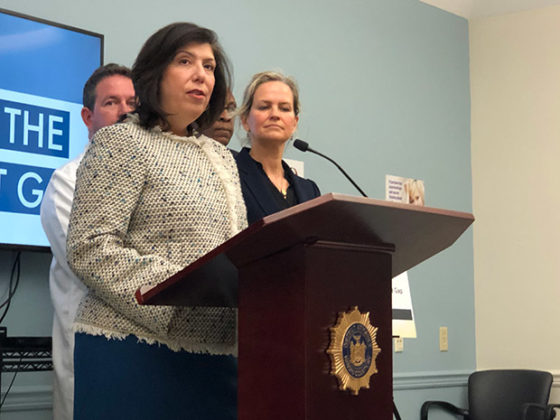
DA appears with County Executive Laura Curran at Maryhaven Center of Hope to announce partnership to help opioid addicts with Northwell Health, Nassau University Medical Center and Catholic Health Services
How did you cope with that?
You work harder to prove yourself. But once you do, at the end of the day, people want someone with the experience to do the job sitting across from them, whether that’s at a meeting, or in some strategy session, or sitting with federal law enforcement partners. They respect the work ethic that you bring in. They respect the experience that you have.
Do you have any idea how many other women DA’s are in the US?
I think in New York State, out of the 62 elected district attorneys, I believe there are only 12 or 13 women. So, yeah, we’re still a very much a minority. And it’s the same throughout: if you look at some of the statistics of women who are judges, I think only a third of judges are women.
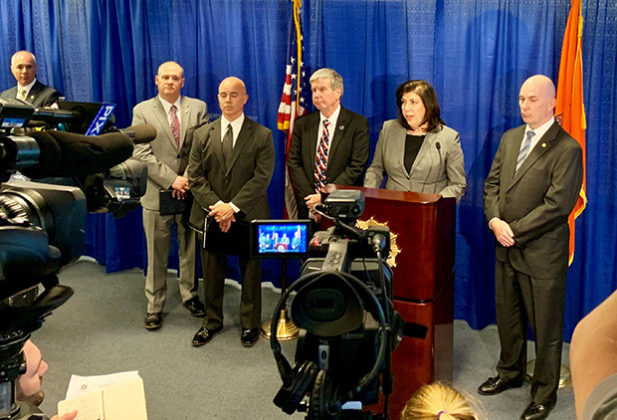
How are women represented in your office?
My executive staff is probably 60% women. And the overall percentage of prosecutors in the officer is probably 65% women as opposed to men. So, you know, I make those decisions carefully and make sure that I’m promoting women to positions of senior management that have executive decision making and they have a very visible and active role in my administration.
How would you describe your style? Do you have a particular style?
I feel like I’m very collaborative. In fact, in my office, I have a round table, because I’ve very consciously asked for a round table to make sure that no one feels they were at the head of the table: so that we could all have an equal voice and we could hear. I like to hear a lot of voices before I make my final decisions. I have a very collaborative style. I’m very open to hearing people’s opinions and very open to new ideas. But once I make a decision, I’m pretty authoritative.
And your style as a prosecutor?
I’m very empathetic when it comes to young people and giving people second chances on a lot of nonviolent crimes. And listening: being very open to hearing people’s stories and what brought them into the criminal justice system and how it is that we can help get them out of the criminal justice system
How did you bring down your crime rate?
Many of our homicides were being committed by MS-13 gang members. So we brought all resources to bear to make sure that these gang members were arrested and prosecuted and given large sentences so that we can keep our communities safe. And I’m proud to say that this year we haven’t had one MS-13 homicide in the county. And that was from a high of something like 35% a few years ago of our homicides were committed by gang members.

DA is holding up a “ghost gun” at a press conference in October. These guns can be printed using a 3D printer and are untraceable
And your work affects other parts of the country?
We have pulled together with the FBI and the DEA and our local law enforcement agencies and put together big operations, very impactful prosecutions, where we’ve targeted high level members of the gang. In 2018, where we were able to or investigate over an eight-month period and ultimately arrest and prosecute the highest ranking MST team member in the entire Eastern United States. That was a prosecution that came out of Nassau County and investigation that we did that netted so much information about the gang that people all across the United States are using, including Suffolk County just most recently, where they arrested something like a hundred gang members based on the information that came out of our wire back in 2018–and we were solving crimes and murders that were going on in New Jersey and, preventing drugs coming in from places like Texas that were targeted for Nassau County.
Why do you think there is such a gang presence in the suburbs?
You know, there’s a lot of theories on that and I don’t think anyone knows for certain: it’s sort of like the immigrant experience: once people find their own they sort of migrate together. A lot of immigrants were unaccompanied minors and were being sponsored and then brought into the same areas in Suffolk and in Nassau County. A lot of the workers were farm workers that were working out in the farms out in Suffolk County. And from there pockets of gangs developed. But again, working with law enforcement, we’ve made an incredible dent: we’ve basically decimated MS-13 leadership on Long Island. To go to zero MS-13 homicides this year in Nassau County is a very significant accomplishment.

Over your years as a prosecutor any particular cases stick out in your mind?
People often ask me that question. It’s a tough one: a lot of the years of my work had been devoted to working with domestic violence cases and sex abuse cases and those have impacted me in tremendous ways, because I don’t think people can appreciate what it’s like to talk to a young child, a six-year-old, an eight-year-old, a 12-year-old who’s been raped or sexually assaulted by someone that’s supposed to care for them. It’s very confusing for a child. At the same time, we work to make so many of these offenders accountable and that’s gratifying.
And a range of other crimes you deal with?
Think of a crime like a financial crime: where a victim has had all of their savings wiped out, their identities taken, and debt run up. That’s devastating for that person. It’s a different kind of devastation, but it’s still devastation. You know, with drunk drivers: people are just trying to get to work, trying to cross the street to get to the supermarket, and in an instant, the entire community, an entire family has been shattered because someone has been run over by someone who made the selfish decision of drinking too much and getting behind the wheel of a car. And with the elderly, I created an elder crimes unit because our elderly, our seniors, are just being devastated by these scams where people call up and victims are tricked into giving these people thousands upon thousands of dollars. We have to step up our game as well to make sure that we can meet all of these challenges.
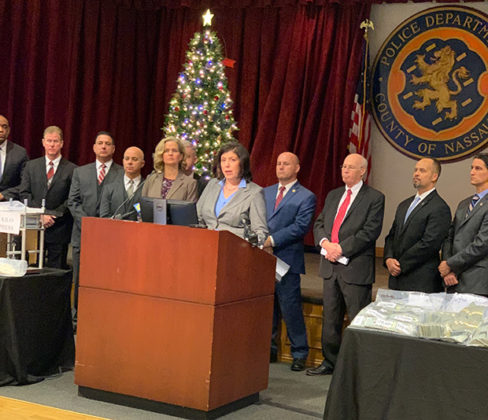
DA Singas, Nassau County Police Commissioner Patrick Ryder, County Executive Laura Curran and federal partners announce largest seizure of heroin in Nassau County history
In the course of your career were you ever threatened or felt afraid for your safety?
Yes, of course, I’ve been threatened and I’ve been threatened as the DA now in my new role. The more dangerous people that you’re prosecuting, these people don’t want to go to jail and they know that I’m the one who stands between them and a life sentence. So, yeah, sometimes I’ve received threats, as have a lot of prosecutors. But defendants realize that if it’s not me prosecuting them then someone else will step in and do the prosecution. And, thank God, I’m surrounded by a lot of excellent detectives and law enforcement looking out for me, so I feel safe.
You grew up in Astoria?
I was born in Massachusetts. I left there when I was about five or six months old and went to Astoria: my parents moved to Astoria and that’s where I grew up.
What are your parents’ names?
They’re both deceased. My father was Vassili, Bill, and my mom was Eugenia.
Where are they from in Greece?
My dad is a Vorio Epirotis, and my mother is also from Epiros. So we are Epirotes, through and through.
What did your dad do?
My dad owned a pizzeria called Singas Famous Pizza in Elmhurst, Queens. A lot of people know that pizza, a lot of people went through that store. My parents were very open, always looking to help people out. So a lot of people got jobs at the store, a lot of people. They helped a lot of people. They were very big in the community and at St. Catherine’s and St. Demetrios in Astoria. My dad was always, and my mom: volunteering in the church festivals, PTA, very much a part of the community, which I think instilled in me this sense of being a part of my community and giving back to the community. I tell people often that my parents didn’t have a lot, in terms of material wealth, but they were always giving and generous people.
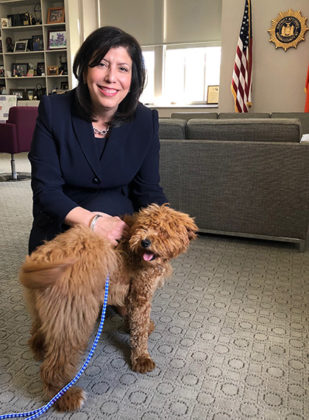
The District Attorney Madeline Singas with a badly abused dog named Bella. The dog’s owners were charged with animal cruelty
Did you work at the pizzeria when you were young?
No, my father would not let me work at the pizzeria or my sister. I have an older sister, she’s a doctor. She says they wanted us to study. Even though my parents were not formally educated, they recognized the value and transformative power of education. Sometimes I think about this and it’s amazing to me. My parents grew up, both of them, in these small villages, in Northern Epiros. They did not have running water in their homes. They did not have electricity in their homes. Epiros was always occupied. There was a lot of famine and poverty and they had such incredibly difficult and challenging lives. But they came here to turn that all around and then in one generation to do just that with their children: for me to be the district attorney, the top chief law enforcement officer of a county of 1.3 million people, to make that transition in one generation is extremely fascinating to me and I believe can only happen in this country.
Did your parents see your success?
My mom died in 1986. She was only 47 years old. I was 20. I was in college. She died of leukemia, and my dad just died probably six or seven years ago. He had a lymphoma, so he lived into his 80s.
How did he feel about your career?
My dad was very proud of me. You know, he had an incredible respect for law enforcement and the law. I say he had what every Greek father wants for his sons: a lawyer and a doctor he got for his daughters and he could not be proud. I have to say he was probably the first feminist, because he felt that we could do whatever we wanted to do as long as we received an education. And he never stood in our way, and tried to help us as much as he could, at a time when a lot of his peers were looking for husbands for their daughters.
What is your sister’s name?
Effie Singas. She’s a pulmonologist at North Shore Hospital.
Tell me about your family: your husband’s name,
Theo. He’s in sales. Successful businessman
How long you been married?
We’re married almost 24 years.
How did you meet?
Oh, we met in Mykonos. He was there with some of his friends. I was there with some of my friends. But we both grew up in Astoria–actually on the same street. We both grew up on 24th Street in Astoria, but didn’t know each other. I didn’t go to local high schools. I went to Bronx Science. You meet a lot of the people in your neighborhood when you go to high school. But we met in Mykonos.
You have twins?
We have twins, 17, a boy and a girl: Vassili, Billy, and Demetra, Deme.
What are they interested in?
Deme likes engineering. She’s very much different from me. Her brain is very mathematical and problem solving. Billy is not sure yet where he’s gonna go: he thinks he wants a career in medicine. But he’s also very musical and Billy and some of his friends are going to play music at my (reelection) swearing in, which I’m very excited about. So, yes, I’m very blessed. I have an incredible family and incredible cousins. My first cousins are like my brothers and sisters, cause we all grew up together. My mom had six brothers and sisters and me and my cousins all grew up together in Astoria. We spent every holiday together. We still do.
Could I ask your age?
Fifty-three. It’s crazy: I can’t even believe I’ve been a prosecutor since 1991–when I can’t even remember being a middle schooler! I remember the first years of my career and it’s incredible how it’s passed. But, you know what, thank God: everyone’s healthy, and we’re also a part of the this community (in Manhasset) Archangel Michael, where my kids grew up and attended Greek school. My son’s an altar boy. They’re both members of GOYA.
Where do you see yourself in five years or 10 years?
It’s hard to know what I’m doing next week, Dimitri! But, you know, again, I see myself doing the work that I love, which is being the district attorney, helping communities, helping people, being a role model for so many of our young people, being part of the Greek community and the larger community. My kids are going to be in college next year, which I can’t even believe it!
Are you still going to be the DA?
Still going to be the DA for as long as people want me.

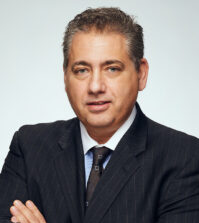













0 comments